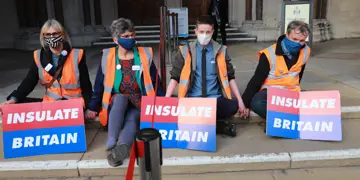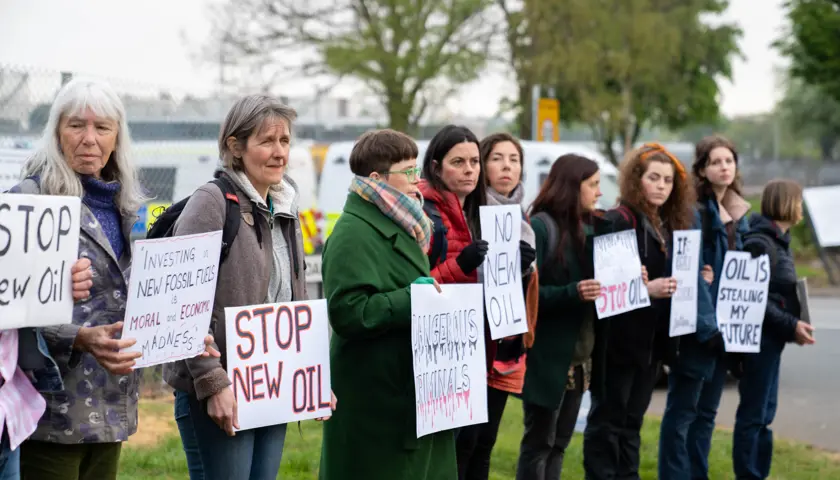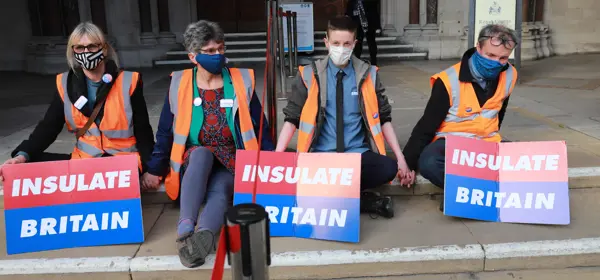Environmental activist GP has licence suspended after blocking traffic on M25
Environmental activist GP has licence suspended after blocking traffic on M25
Tribunal finds Diana Warner’s fitness to practise ‘impaired’
A doctor who blocked traffic on the M25 motorway as part of environmental action for Insulate Britain has been suspended for three months after a tribunal found her fitness to practise impaired.
Diana Warner (pictured above, second from left), a GP since 1989, admitted sitting down on the carriageway, holding a banner and gluing herself to the road on 27 October 2021 to an MPTS (Medical Practitioners Tribunal Service) hearing – this was in breach of an injunction made by the High Court preventing such behaviour.
Dr Warner, a doctor since 1982 who retired from clinical practice in 2019, also admitted ‘blocking, endangering, slowing down, preventing, or obstructing the free flow of traffic on to or along or off the M25 for the purposes of protesting’ on 29 October 2021 and ‘refusing to leave the area of the M25 when asked’ by police.
Her non-violent direct action was considered by a criminal court to be deliberate and in contempt of court. She was sentenced to two months and 30 days in prison, respectively, for the two actions.
In May 2022, Dr Warner was sentenced to a further 12 weeks in prison after being convicted of ‘damaging furniture’ at Stratford Magistrates Court by glueing herself to it during a hearing in which she was charged with causing a public nuisance on the M25 near Heathrow Airport on 27 September 2021. She also admitted this to this month's MPTS hearing in Manchester.
The hearing, triggered automatically because GMC rules stipulate all convictions resulting in a custodial sentence are directly referred to a medical practitioners tribunal, found Dr Warner’s fitness to practise has been impaired by her criminal convictions.
The tribunal found Dr Warner’s action amounted to misconduct and chose to suspend her licence to practise for three months. The GMC submitted that it was not in the public interest to strike her from the register altogether. The tribunal concluded that a lengthier suspension would have been ‘disproportionate’.
‘Responsibility’ to act
The hearing heard there have been no previous concerns raised about Dr Warner’s fitness to practise since she qualified as a GP, and of her long-standing environmental activism – she twice stood as a Parliamentary candidate for the Green Party.
Dr Warner stated that she tried to set up a dialogue with the GMC around doctors’ responsibility to safeguard the public’s health from the ‘existential threat’ of climate change and ecological emergencies between May and September 2019. She said she believes the GMC should do more to bring doctors and health organisations together to safeguard population health.
In the hearing, Dr Warner produced research which she said showed how work being done to halt climate change was not enough and that this was analogous to treating a patient for only half of their illness despite the other part being potentially fatal.
She added that it is ‘incumbent’ on the healthcare system and professionals to work with scientists and the Government to make sure societies keep within all planetary boundaries so all key earth systems have a chance to recover.
Climate change is the biggest public health crisis in the UK and globally
Dr Warner
Dr Warner told the hearing how it is her ‘strong conviction’ that the only way to force this agenda before government is through disruption.
She argued that the aims of the Insulate Britain campaign were ‘uncontroversial, evidence-based, and consistent with the scientific and political consensus’. She accepted the peaceful protests were unlawful in that they breached a civil injunction and caused inconvenience to road users, but noted how that was ‘the essence of the protest’.
In her evidence, Dr Warner – who self-referred to the GMC in April 2022 – argued that criminal convictions for matters of social conscience should not automatically be subject to regulatory action, ‘otherwise there would be a de facto blanket restriction on the ability of doctors to participate in acts of civil disobedience without risking their careers’.
She submitted that the nature of the protest, its relationship with the medical profession, and a doctor’s cooperation with the justice system and GMC should be taken into consideration.
Further, she argued that the GMC’s Good Medical Practice guidance says ‘we don’t wish to prevent doctors from practising in line with their beliefs and values’.
Public health concerns
Dr Warner said she is concerned about the effect of climate change on public health and sees her activism as a continuation of her vocation as a doctor and would enhance, not reduce, public trust in the profession.
She told the tribunal her grandmother was killed by the Nazis in the Second World War and that this meant she ‘grew up with the conviction that government cannot be relied on to keep you safe’ which ‘resulted in my committing to take part in more disruptive forms of non-violent direct action for our children’s survival’.
In her evidence, Dr Warner said: ‘Climate change is the biggest public health crisis in the UK and globally,’ and compared the lack of action with a ‘missed diagnosis’.
She argued ‘there is a long history of doctors taking a blinkered view on health’, such as inequalities on women’s health and endemic racism in healthcare systems.
Dr Warner said evidence shows how direct action has been effective throughout history, from the women’s suffrage movement to Nelson Mandela’s ANC (African National Congress) fighting against apartheid, adding that Insulate Britain has been entirely non-violent – unlike the Suffragettes and ANC – and has helped raise public awareness of the climate emergency.
She said fossil-fuel companies have known the dangers of carbon pollution since the 1970s and are funding think-tanks, which influence government policy and result in media output, which may convince people climate change is not a serious matter. Doctors, she argued, regularly evaluate scientific research and are in a ‘better position than most’ to analyse information.
Dr Warner added that climate anxiety is negatively affecting people’s mental health.
She told the hearing how she intends to continue protesting to draw attention to the climate emergency and had thought ‘long and hard’ about her actions in advance.
Lawyer support
Melinda Janki, a lawyer who has taken on ExxonMobil for its offshore oil drilling and is co-founder of the Lawyers Are Responsible action group, gave a statement to the hearing.
She said it was her opinion that Dr Warner’s action ‘does not constitute an attack on the rule of law’.
‘Viewed from the perspective of the rule of law and the obligation to uphold the right to life, Dr Warner’s actions are fully in harmony with the values upon which the rule of law rests,’ she said in her statement.
‘In my opinion the rule of law not only protects Dr Warner in carrying out such actions but may even require her to commit acts that would technically be considered unlawful in the interests of protecting life by drawing attention to the existential threat to humanity posed by fossil fuel pollution.’
She said it was her view that the rule of law requires the GMC not to seek sanctions against Dr Warner and ‘to consider the existential threat posed by fossil fuels, to consult the medical profession and the public, and to take action to bring about an end to fossil fuels in order to protect human life’.
‘Serious departure’ from guidelines
The GMC submitted that Dr Warner’s two committals to prison amounted to misconduct, and that her fitness to practise is impaired ‘by reason of misconduct and conviction’.
The regulator accepted it has ‘no concerns about Dr Warner’s clinical capabilities’ but argued her actions are a ‘serious departure’ from its Good Medical Practice guidelines.
Referring to the GMC’s advice on doctors taking part in protests of other forms of activism, the regulator’s representative argued Dr Warner’s actions had risked harm to others or damage to property and involved repeated breaches of the law – which they said shows there was ‘no de facto blanket restriction’ on doctors’ ability to protest.
The GMC submitted that Dr Warner’s actions could be described as ‘deplorable’ by fellow medical practitioners, and that she has brought the medical profession into disrepute.
Dr Warner’s actions are fully in harmony with the values upon which the rule of law rests
Melinda Janki
In submissions, the regulator said Dr Warner admitted she was aware of a risk of causing harm to others during the action and has ‘poor insight into the consequences’ of her actions.
It submitted that a finding of impairment was required to ‘promote and maintain public confidence in the medical profession’ and to ‘promote and maintain proper professional standards and conduct’.
Dr Warner said her actions did not amount to misconduct and her fitness to practise is not impaired. She urged the tribunal to take no further action, saying her actions were a form of peaceful protest that should be accepted in a well-functioning democracy.
No clinical concerns
The tribunal panel noted how Dr Warner’s conduct had not occurred in the course of her professional life, and she has had a ‘previously unblemished career’.
But it found that Dr Warner’s actions were a departure from the GMC’s Good Medical Practice guidelines and could affect public trust in the profession.
The tribunal concluded that, while some members of the public would agree with Dr Warner’s decision to engage in peaceful protests despite the risks, ‘a portion’ would be ‘extremely concerned by a medical practitioner deciding to put the public at risk, no matter the motivation’.
The tribunal decided ‘the public would expect doctors to act in a manner which upheld the reputation of the profession’ and said it was not up to Dr Warner to determine which laws are applicable to her.
The panel said it had been mindful that not all criminal convictions would result in a decision of impairment but that the nature of Dr Warner’s conviction was ‘serious enough’ to warrant that decision despite her arguments that she had carefully considered the risk of her action and ‘gained nothing personally from the protests’.
The tribunal found a ‘significant risk’ of repetition given Dr Warner has not ruled out the possibility of acting again in the future.
Previous hearing
Dr Warner’s hearing followed the tribunal of Sarah Benn, a retired GP and environmental activist who had her GMC licence suspended for five months having breached a court order preventing her from protesting by an oil terminal.
Speaking to The Doctor after the hearing, Dr Benn said the tribunal decision was ‘misguided’.
The BMA, which is supporting Dr Benn with an appeal, said the ruling in her tribunal sends a ‘worrying message’.
The decision to suspend Dr Benn is due to be reviewed, at which point she will either have her licence revoked, extended or her registration erased altogether.
Dr Warner will not face a review. The tribunal concluded that Dr Warner’s position ‘that her misconduct was justified’ is ‘unlikely to change’.
At the BMA annual representative meeting in June this year, members backed a motion calling for the union to advocate for protections against punitive actions for doctors participating in activism ‘lawfully’.
- Until September 2024, resident doctors were referred to as ‘junior doctors’ by the BMA. Articles written prior to this date reflect the terminology then in use




